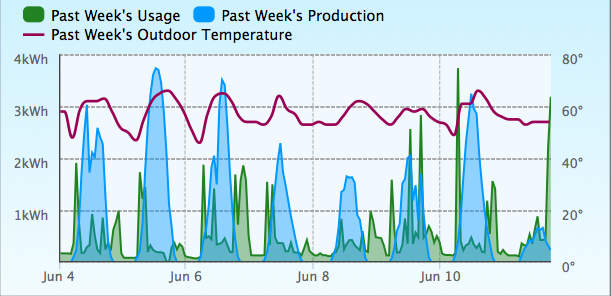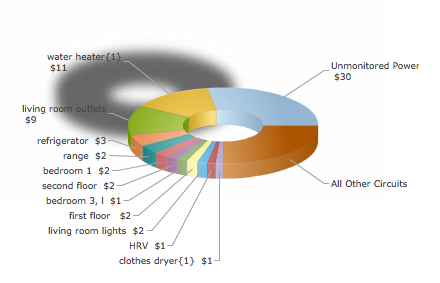 Starting in June 2013, the home of Still Water Co-Directors Jon Ippolito and Joline Blais becomes an experiment in sustainable living through digital feedback. This net-zero-energy unit in the award-winning Belfast Cohousing & Ecovillage now includes a smart grid whose energy generation and use patterns can be monitored in real-time on the Web.
Starting in June 2013, the home of Still Water Co-Directors Jon Ippolito and Joline Blais becomes an experiment in sustainable living through digital feedback. This net-zero-energy unit in the award-winning Belfast Cohousing & Ecovillage now includes a smart grid whose energy generation and use patterns can be monitored in real-time on the Web.
While some academics research sustainable environments by writing grants or publishing studies, this academic family is trying to also move knowledge to action. Thanks to sensors and digital technology, Joline  conducts research every time she opens the refrigerator, and Jon does the same when he takes a shower (humidity and temperature of the bathroom are monitored closely) or turns on a lightbulb.
Belfast Cohousing architecture firm GO Logic has installed sensors throughout the family’s’ two-story unit that measure electrical load as indexed by outside temperature, time of day, and other conditions with great precision. Wireless meters published these data in real-time on the Web for review by the architects and family members so they can use this feedback to adjust their living practices to live as carbon-free as possible.

The results of this experiment will be used to optimize the GO Logic Passivhaus design for future sustainable building projects. This design has already won the 2011 Project of the Year from the US Green Building Council, and in the case of this  home includes triple-pane windows, cellulose and foam insulation, solar photovoltaic cells and hot water, and a design that maximizes heat in the winter and minimizes it in the summer.
 Alan Gibson, GO Logic principal with architect Matt O’Malia and fellow resident of Belfast Cohousing & Ecovillage, proposed the experiment in gauging the electrical usage of a family as part of GO logic’s commitment to sustainable design. Homes and buildings are responsible for 48 percent of all greenhouse gas emissions, according to data from the U.S. Energy Information Administration.
Alan Gibson, GO Logic principal with architect Matt O’Malia and fellow resident of Belfast Cohousing & Ecovillage, proposed the experiment in gauging the electrical usage of a family as part of GO logic’s commitment to sustainable design. Homes and buildings are responsible for 48 percent of all greenhouse gas emissions, according to data from the U.S. Energy Information Administration.
GO Logic estimates that each owner can expect to save about $50,000 in fuel costs over 20 years. The “cohousing” part of Belfast Cohousing & Ecovillage means residents can also split costs for things that can be shared, from tractors to snowblowers to bicycles.

“@jolineblais conducts research every time she opens the refrigerator or turns on a lightbulb” http://t.co/b9krhYPxqU @stillwaternet
Sweet! RT @stillwaternet The Wired #Ecovillage: will a smart house leave a smaller footprint? http://t.co/1EiZ3DuJeZ #sustainability #solar
RT @craigdietrich: “@jolineblais conducts research every time she opens the refrigerator or turns on a lightbulb” http://t.co/b9krhYPxqU @s…
Excited to be part of this! RT @stillwaternet The Wired Ecovillage: will a smart house leave a smaller footprint? http://t.co/K9uv6jFzV9